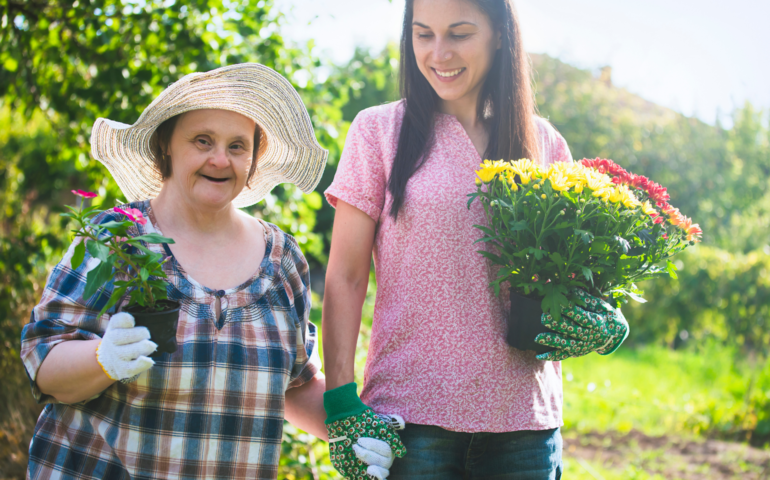Our Green Taskforce and their eco success stories

The aims of the Green Taskforce include:
1. Set up of a forum to share best practice around environmental, horticulture and green projects across United Response.
2. Ensure people we support are aware of and leading on green issues.
3. Support the development of green champions across the charity to include staff and people we support.
4. Deliver green community engagement activities that link the people we support with their local communities.
5. Identify and create local green partnerships and opportunities to work collaboratively around green activities.
6. Linking the Green Taskforce with the organisational environmental policy, working collaboratively to support the development and delivery of an organisation-wide green action plan.
7. Develop a ‘United Response green brand’ and/or best practice toolkit for services.
What’s being delivered?
- Bristol – Potter’s Den allotment
- Community gardens in Teddington
- Teddington Enterprise Centre
- Incredible Edibles in Kent
- Donation Station, Kent
- Carlton Centre, Cornwall
- Blackpool – Potter’s Den allotment
- Amazing Waste in Darlington
- Community Garden at Autism Hub in York
- Bootshop, Easingwold, North Yorkshire
- Two farms – Boscawen in Cornwall and Lower Sharpam in Devon
Eco projects get green light
In 2021, we developed the ‘United in Bloom’ competition. This is an annual competition for people we support to showcase their green fingered skills. The judging categories are: Best indoor garden; Best small garden; Most sustainable/ insect friendly garden; Tallest sunflower; and Best hanging basket of fruit or flowers.
And we restarted the Bristol allotment project. Potter’s Den is the name we agreed to use for existing and future allotment projects. There are currently four Potter’s Dens (Blackpool, Bristol, Teddington and Cornwall).
Using a community development approach, we were able to recruit 24 local volunteers in Bristol.
We also contacted and joined several Bristol-based environmental action groups including organic gardening forums, community farms, local voluntary and community organisations. In addition, we joined Bristol Green Capital, Bristol Council’s green strategy initiative that supports the Council’s vision and contribution to net-zero carbon emission.
We also actively sought and developed Community Partnerships with local voluntary and community organisations, including:
- Barton Hill Settlement (which supports and feeds low-income individuals and families),
- Dementia Care,
- Bristol Heritage Seed Bank, and
- Step & Stones (a small Bristol-based community group supporting people with learning disabilities and autism).
With staff supervision and planting plans created by people we support, the volunteers completely transformed the site during the lockdown. Fifteen of the 24 volunteers recruited remain actively involved with the allotment. 470 volunteering hours were delivered over a three month period.
With the help of fundraising, we applied for and were successful in gaining £6,000. This was a much-needed contribution to the funding of equipment for the project. We are currently working on further funding for a Green Support Worker to provide additional support to take the project forward.
To progress the development of the site we identified and secured several corporate sponsors who will support with purchasing and installing a summer house and compressed paving that will enable wheelchair users to move freely around the allotment.
The Potter’s Den allotment development will support us in creating community-based activities for the people we support through community partnerships. We aim to link with companies willing to deliver on their corporate social responsibility and social value to create green environmental and horticultural activities that promote healthier and more cohesive communities for the people we support and the wider community.
United in growing communities approach
The development of recycling, upcycling and repurposing activities will be another strand within our ‘United in Growing Communities’ approach that will lead to the delivery of meaningful, educational and employment opportunities for people with needs in our community. We will focus on supporting the people we support to lead on and engage with environmentally sustainable activities at the heart of their local community.
The support, engagement and training of community volunteers is also central to delivering our approach. We are working to grow our volunteering as a key strategy to increase community engagement and involvement for the people we support.